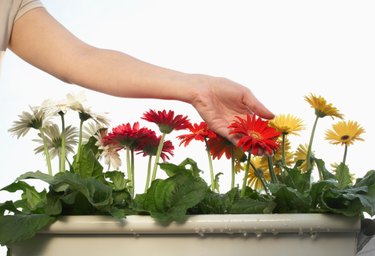Things You'll Need
Water-soluble fertilizer
Hand pruners

The Gerber daisy or African daisy (Gerbera jamesonii) is a native of South Africa. The plants have tall, central stalks with large, brightly colored daisy-like flowers in cream, crimson, orange, yellow and pink. In the extreme southern U.S. states, gerberas are perennials, but in all other areas, the leaves turn black and die back at the first frost. With proper care, however, the gerbera will thrive all spring and summer.
Step 1
Place the gerbera plants in a location that receives at least six hours of sunlight per day. They can also tolerate partial sunlight locations, however, the blooms will not be as abundant or colorful.
Video of the Day
Step 2
Water the soil until it is damp to a 3-inch depth, or until it runs out of the bottom of the pot if the gerbera is in a container. After soaking the soil, spray the leaves of the gerbera, but not the flowers, with a light spray to deter spider mites. Allow the top 1/2 inch of soil to dry out before adding additional water.
Step 3
Apply a water-soluble fertilizer that is high in phosphorous and potassium, which are the last two numbers on the fertilizer package. Spread the fertilizer over the soil under the gerbera once per month from spring until fall using the amounts instructed by the fertilizer label.
Step 4
Examine the plants daily to locate any blooms that have begun to wilt and fade. Prune off all wilting blooms by cutting the entire stalk off near the center of the plant using hand pruners. This causes the plant to continue blooming throughout the growing season.
Tip
When temperatures rise above 70 degrees Fahrenheit, the plants often stop blooming but resume once temperatures fall again.
Video of the Day